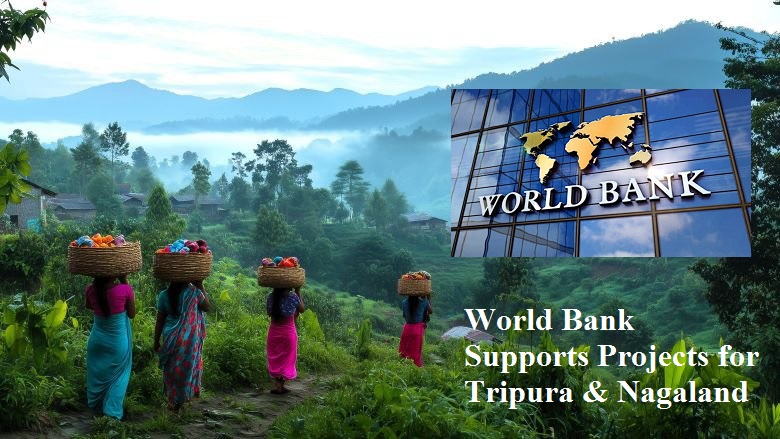World Bank Supports Projects for Tripura & Nagaland has huge implications for North East India

The $225.5 million Enhancing Landscape and Ecosystem Management (ELEMENT) Project will help conserve and restore over 100,000 hectares of forest thus enhancing landscape-based value chains for economic transformation while avoiding almost 435,000 tons of carbon emissions per year. The Project will also strengthen soil conservation and improve water availability. “The Project will contribute to leveraging forests for private sector driven job creation in non-timber economic activities, enhancing the carbon sink capacity of the forest, and ultimately contributing to economic growth and social well-being in Tripura and Nagaland,” said Auguste Tano Kouame, the World Bank’s Country Director for India. The ELEMENT project aims to open up economic opportunities for communities through forest produce such as agarwood, bamboo and honey in partnership with the private sector. It will also help to enhance national parks and protected areas, as well as develop nature-based tourism facilities. The Project aims to create 60,000 jobs for youth and women, by promoting forest-based entrepreneurship through skills training in areas such as hospitality and training for nature guides.
The Project will take an integrated and holistic landscape approach on forest management. “This goes beyond traditional forests to include areas like grasslands, wetlands, and farmlands to maximize community benefits,” said Pyush Dogra and Raj Ganguly, the Task Team Leaders for the project. “This will improve climate resilience of rural and forest-dependent communities and increase their livelihoods.” This financing comes on the heels of the Bank’s $43 million financing to support similar activities in the sister state of Meghalaya. The loan from the International Bank of Reconstruction and Development (IBRD) has a final maturity of 12 years with a grace period of 4.5 years. The Project will also benefit from a complementary Global Partnership for Sustainable and Resilient Landscapes (PROGREEN) grant in the amount of $2.4 million.
Projects supported by the World Bank in Northeast India have significant implications across multiple sectors, including infrastructure development, economic growth, social inclusion, and environmental sustainability. Below are some key implications:
1. Economic Development and Regional Integration:
Improved Connectivity: Projects like the Northeast Road Sector Development Project aim to improve road infrastructure, enhancing connectivity within the region and with neighboring countries. This fosters trade and commerce, integrating the region with national and international markets.
Boost to Livelihoods: Initiatives such as the North East Rural Livelihoods Project (NERLP) empower rural communities by enhancing agricultural productivity, providing skills training, and supporting micro-enterprises.
2. Social Inclusion and Poverty Reduction
Empowerment of Marginalized Groups: Many World Bank-funded projects prioritize the inclusion of women, tribal communities, and economically disadvantaged groups. For example, the NERLP focuses on women-led self-help groups and tribal empowerment.
Access to Services: Investments in education, healthcare, and water supply improve living standards in the region’s remote and underserved areas.
3. Environmental Sustainability
Preservation of Biodiversity: The region’s rich biodiversity is addressed through projects promoting sustainable natural resource management. For instance, forest-based livelihood initiatives support conservation while offering economic benefits to local communities.
Climate Resilience: Projects emphasize building resilience against climate risks, such as floods and landslides, which are prevalent in the region. Sustainable infrastructure and agricultural practices help mitigate environmental risks.
4. Strengthening Institutions and Governance
Capacity Building: World Bank projects often include components to strengthen local governance and institutional frameworks. This improves project implementation, accountability, and transparency in resource utilization.
Policy Development: Support for policy reforms helps state governments in the Northeast adopt sustainable development practices.
5. Strategic Geopolitical Importance
India’s Act East Policy: Improved infrastructure and economic linkages in the Northeast align with India’s Act East Policy, boosting cross-border trade and cooperation with Southeast Asia.
Border Security: Development projects indirectly contribute to stability in this border-sensitive region by addressing socio-economic grievances.
6. Challenges and Risks
Sociocultural Sensitivities: Development projects must navigate ethnic diversity and local sensitivities to ensure community participation and avoid resistance.
Environmental Concerns: Large-scale infrastructure projects may pose threats to the region’s fragile ecosystems if not carefully managed.
Implementation Hurdles: Logistical challenges, difficult terrain, and insurgency-related issues can delay or complicate project execution.
Case Studies
North East Rural Livelihoods Project (NERLP): Empowered over 300,000 households by increasing income-generating activities and improving access to credit.
Assam Agribusiness and Rural Transformation Project (APART): Boosted agricultural value chains and farmers’ access to markets.
The World Bank-supported projects in Northeast India catalyze sustainable development, foster inclusivity, and improve the region’s connectivity and economic prospects. However, success depends on balancing development needs with environmental protection and cultural preservation.






